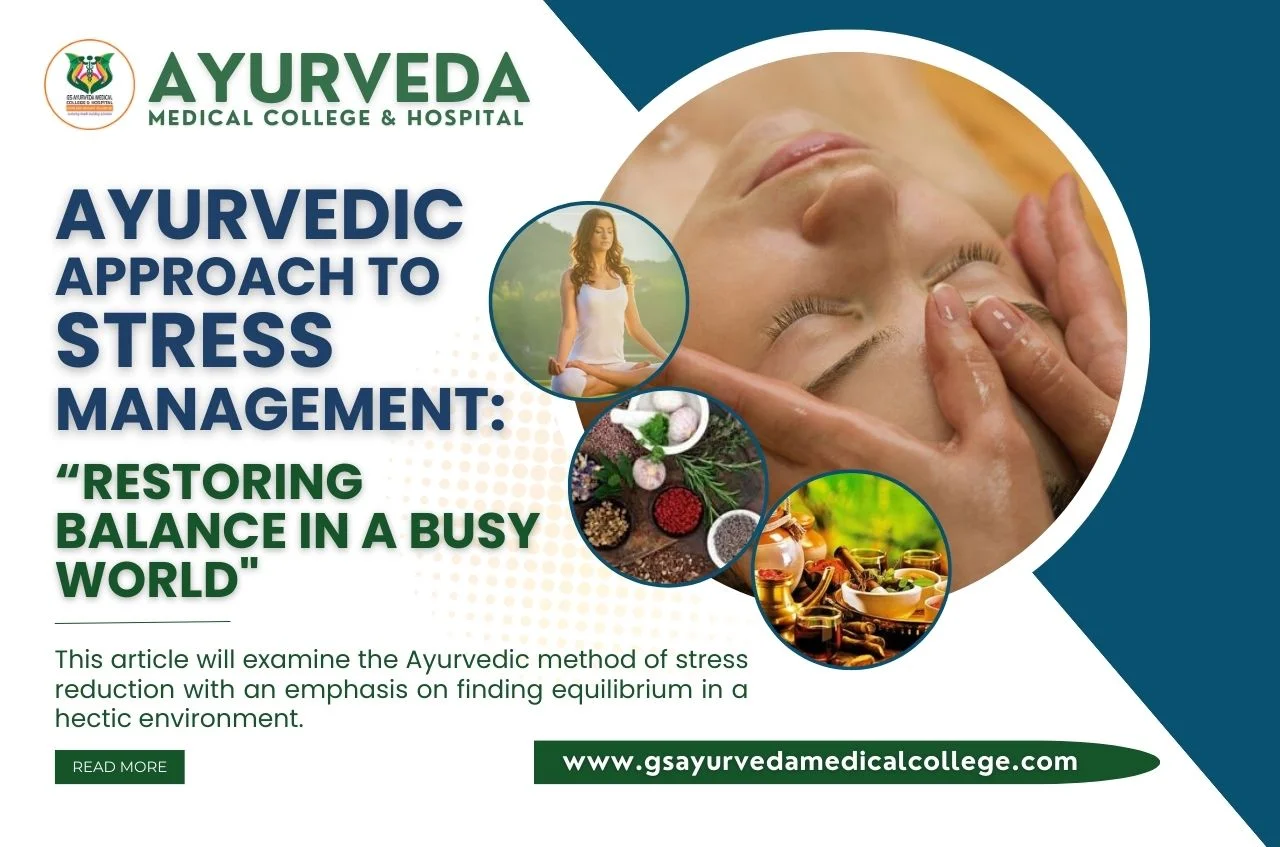
Ayurvedic Approach to Stress Management: “Restoring Balance in a Busy World"
The incessant demands and pressures of job, relationships, and everyday duties have made stress a part of our modern life. Many people feel overwhelmed, nervous, and worn out in our fast-paced, technologically-driven world. To maintain general well-being in such a situation, learning practical stress management and reduction techniques is essential.
Recently, there has been a lot of attention in the traditional Ayurvedic medicine of India. Ayurveda offers a unique point of view on stress reduction because it is founded on total good health and natural relieve. This article will examine the Ayurvedic method of stress reduction with an emphasis on finding equilibrium in a hectic environment.
Understanding Ayurveda Concept - The Ancient Science of Life
Ayurveda, often known as the "Ancient Science of Life," is a deep-rooted medical system originating from India, with a history spanning thousands of years. This comprehensive health philosophy aims to attain equilibrium and unity among the body, mind, and spirit. Its foundation rests on the concept that every person is a distinct blend of three primary energies called doshas: Vata, Pitta, and Kapha. These doshas govern various physiological and psychological functions, and imbalances among them lead to health issues, including stress.
Ayurveda's essence is captured in its emphasis on prevention rather than mere treatment. It underscores the significance of aligning with nature's rhythms and recognizing the interconnectedness of all living things. By understanding one's dosha composition and following personalized recommendations, individuals can make conscious choices regarding diet, lifestyle, and daily routines to maintain optimal well-being.
This ancient science embraces a wide array of techniques, from herbal remedies and dietary adjustments to yoga, meditation, and massage. By addressing the root causes of imbalances and promoting harmony, Ayurveda offers a holistic path to health and stress management, resonating with its timeless wisdom in the modern world.
Seeking Professional Guidance: Consultation with Ayurvedic Experts
To truly embrace a holistic approach to stress management, it's highly beneficial to seek guidance from seasoned Ayurvedic experts. These knowledgeable professionals possess the expertise to delve deep into your individual constitution through personalized assessments. Based on these evaluations, they offer targeted treatments and lifestyle recommendations that align with your unique needs. This tailored method ensures that every aspect of your health is taken care of, resulting in impactful and enduring stress alleviation. Their understanding enables you to make knowledgeable decisions that align your mind, body, and spirit, creating a feeling of equilibrium that goes beyond the pressures of today's world.
Identifying the Root Causes of Stress
In Ayurveda, stress isn't considered an isolated issue; instead, it's seen as a sign of underlying disruptions in both the body and mind. To tackle stress effectively, it's crucial to pinpoint the underlying sources or triggers that disturb the innate balance. Some common causes of stress in Ayurveda include:
Imbalanced Doshas: Vata imbalances, characterized by excessive movement and instability, can lead to anxiety and restlessness. Pitta imbalances, associated with excessive heat and intensity, can cause irritability and anger. Kapha imbalances, marked by oppressiveness and lethargy, can lead to feelings of depression and inactivity.
Poor Digestion: As per Ayurveda, weak digestion can add to the buildup of toxins, known as ama, in the body. These toxins can disturb the energy flow and add to feelings of stress and anxiety.
Lack of Routine: Irregular daily routines, such as inconsistent sleep patterns and meal times, can disturb the body's natural rhythms and contribute to stress.
Environmental Factors: Ayurveda recognizes that external factors, such as excessive noise, pollution, and sensory overload, can also contribute to stress.
Ayurvedic Strategies for Stress Management
Ayurveda provides a comprehensive method for feeling stress, emphasizing the restoration of harmony within the mind, body, and spirit. Here are some Ayurvedic approaches that can aid in easing stress and enhancing overall eudemonia:
1. Balancing the Doshas
Ayurvedic treatments for stress management aim to balance the doshas and restore harmony within the body. This may involve lifestyle modifications, dietary changes, herbal remedies, and specific Ayurvedic therapies tailored to an individual's dosha. For example:
Vata Dosha: Individuals with imbalanced Vata may benefit from grounding practices, such as daily self-massage with warm sesame oil, gentle yoga, and meditation.
Pitta Dosha: Cooling and calming practices, such as consuming cooling herbs like mint and coriander, practicing pranayama (breathing exercises), and engaging in activities that promote relaxation, can help balance Pitta dosha.
Kapha Dosha: To balance Kapha dosha, individuals may benefit from regular exercise, stimulating herbs like ginger and cinnamon, and engaging in activities that promote vitality and movement.
2. Mind-Body Practices
Ayurveda highlights the strong connection between the mind and body, recognizing that mental well-being greatly impacts physical health. Engaging in mind-body practices can aid in managing stress. These practices encompass:
Yoga: Performing yoga poses, breathing exercises, and meditation can soothe the mind, alleviate anxiety, and induce relaxation.
Meditation: Regular meditation fosters a tranquil mind, enhances concentration, and brings emotional equilibrium.
Pranayama: Breathing exercises, like alternate nostril breathing, can regulate breath, calm the nervous system, and diminish stress.
3. Ayurvedic Diet and Nutrition
Incorporating an Ayurvedic diet with specific foods and spices can aid the body's natural equilibrium and diminish stress. Ayurvedic dietary suggestions for managing stress encompass:
Avoiding Stimulants: Restricting caffeine, alcohol, and processed foods intake can ease anxiety and enhance tranquility.
Mindful Eating: Practicing mindful eating, relishing each bite, and tuning into hunger and fullness cues encourages healthy digestion and reduces stress.
Incorporating Comforting Foods: Consuming warming, nurturing foods like soups, stews, and cooked veggies can calm Vata and establish a grounded, stable feeling.
Herbal Solutions: Ayurvedic herbs like Ashwagandha, Brahmi, and Jatamansi possess calming and stress-alleviating properties. Collaborating with an Ayurvedic specialist aids in selecting appropriate herbs for individual needs.
4. Daily Routine and Self-Care
Creating a daily schedule that syncs with the body's circadian rhythms fosters balance and minimizes stress. Ayurvedic suggestions for daily routine and self-care include:
Early Morning Wake-Up: Getting up early, ideally before sunrise, harmonizes the body with nature's rhythms, cultivating serenity and clarity.
Oil Pulling: Engaging in oil pulling, an age-old Ayurvedic method of swishing oil in the mouth, enhances oral health, detoxifies the body, and diminishes stress.
Self-Massage: Regular self-massage with warm oil, known as Abhyanga, can promote relaxation, improve circulation, and nourish the skin.
5. Creating a Calm Environment
Ayurveda recognizes the impact of the external environment on our well-being. Creating a calm and harmonious living space can help reduce stress. Some Ayurvedic recommendations for creating a calm environment include:
Decluttering: Keeping the living space clean, organized, and free from clutter can promote a sense of calm and clarity.
Soothing Colors: Using calming colors such as soft blues, greens, and earth tones in the living space can promote relaxation and tranquility.
Aromatherapy: Using essential oils like lavender, chamomile, and sandalwood can establish a calming ambiance and induce relaxation.
Choosing the Right Path
If you're keen on exploring Ayurveda's world and mastering stress management through this holistic method, seeking guidance from specialists is crucial. Identifying the right Ayurvedic Colleges in UP for studying is vital to grasp its principles and practices holistically. For those aspiring to pursue an Ayurvedic career or simply broaden their understanding, some of India's Top Ayurvedic college in UP. These colleges provide extensive courses covering Ayurvedic fundamentals, therapies, and stress relief methods.
FAQs
1. Is Ayurveda only about herbal remedies?
Ayurveda encompasses a holistic approach to health, including diet, lifestyle, and mental well-being, in addition to herbal remedies.
2. Can I practice Ayurveda without professional guidance?
Although you can adopt certain Ayurvedic practices on your own, seeking guidance from an Ayurvedic specialist offers tailored and impactful advice.
3. When can one start noticing the advantages of Ayurveda in managing stress?
Individuals vary, but consistent practice of Ayurvedic techniques can yield noticeable improvements in stress levels over a few weeks to months.
4. Are Ayurvedic colleges limited to aspiring practitioners?
Best Ayurvedic College in UP offers education for both aspiring practitioners and individuals interested in incorporating Ayurvedic principles into their lives.
5. Is Ayurveda effective for everyone in managing stress?
Ayurveda offers personalized approaches based on individual dosha types, making it effective for most people. However, consulting an Ayurvedic practitioner is recommended to receive tailored recommendations.
6. Can Ayurvedic practices be used alongside conventional medical treatments?
Yes, Ayurvedic practices can complement conventional treatments. It's important to inform both your Ayurvedic practitioner and your primary healthcare provider about any ongoing treatments.
7. Can Ayurveda help with chronic stress and anxiety disorders?
Ayurveda's holistic approach can provide relief for chronic stress and anxiety. It's essential to work closely with an Ayurvedic practitioner to develop a comprehensive treatment plan.
Conclusion
Amidst the hustle of modern life, effective stress management holds the key to overall health. Ayurveda's approach offers a holistic path that addresses stress's core and seeks equilibrium in a busy world. Through dietary shifts, herbal support, yoga, meditation, and mindfulness, people can embrace this ancient system's wisdom for a healthier, harmonious life.
Budding Ayurvedic enthusiasts can embark on this transformative journey by joining Top BAMS Colleges in UP. Here, they'll grasp Ayurvedic principles and learn to apply them practically. By doing so, they contribute to a timeless tradition's revival, bringing healing and balance amid swift change.

